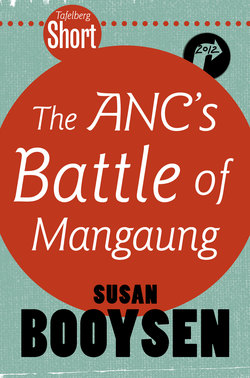Tafelberg Short: The ANC's Battle of Mangaung

Реклама. ООО «ЛитРес», ИНН: 7719571260.
Оглавление
Susan Booysen. Tafelberg Short: The ANC's Battle of Mangaung
The ANC’s Battle of Mangaung
Introduction – the ANC, the president and the conundrum[1]
The ANC under Zuma approaching Mangaung on wobbly legs
Lessons from Polokwane … genie forever out of the bottle?
From ‘no-campaigning campaign’ to ‘settled outcome’ to ‘contest’: End of the story?
The ANCYL-mother body war – ‘ill discipline’ as Mangaung ammunition
From leftward turn to ‘radical shift’ – the ANC ideologically adrift?
Factions fiddling the transition while South Africa is waiting
The ANC’s choice … to rekindle or douse the Centenary flame
Acronyms
About the book
About the author
Tafelberg Short books
Imprint page
Отрывок из книги
Susan Booysen
The signals going into Mangaung are those of compromise, mostly driven by the need not to see a replay of Polokwane. There are likely leadership compromises, presidential candidacy give-and-takes, slates-for-peace, and negotiations to try and ensure that deployment will be secure. Proponents of a compromise argue that a repeat of the Polokwane scorched earth of fallout that reverberated into the state and delivery needs to be avoided.
.....
The ANC has recorded electoral decline during Zuma’s leadership, although this has been veiled by the movement’s belated rise in KwaZulu-Natal. The ANC never realised its dream to conquer the Western Cape province electorally (only briefly through its usurpation of the New National Party at the time of floor-crossing). It was sheltered, for the time being, in citizens’ predominant choice not to express their discontent with the ANC through votes. ANC supporters and members chose inventively, for example, to combine voting for the ANC with community protests and intense criticism of their ANC in the periods between elections, or to abstain rather than switch to an opposition party. The electoral dividends, however, were no longer being regenerated at replacement level. One of the greatest threats the ANC faced was a leadership that fiddled and cadres that fought factional battles while the base was burning … not fatally, and not falling apart yet, but raising questions about long-term organisational viability.
This book takes stock of the forces playing out in the continuously changing ANC at the point of the important ‘Mangaung moment’. The analysis recognises the contradictions of the ANC-people relationship. Despite contradictions and questions, South Africans largely continue to believe that the ANC is advancing and protecting their rights. The ANC that this book assesses, at the intersection of ‘Centenary’ and ‘Mangaung’, has displayed uncanny abilities to continuously reinvent itself. It staggers and encounters crises, yet then re-emerges as a changed but leading organisation. The Mangaung question is whether the Mangaung moment will bring a weakened ANC, or whether there could spring a renewed party or movement, determined to deliver better and cleaner: one that could be set to take South Africa into a durable longer-term future.
.....